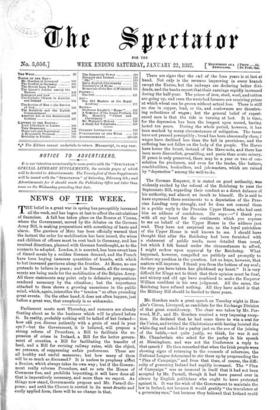The German Emperor, it is stated on good authority, was
violently excited by the refusal of the Reichstag to pass the Septennate Bill, regarding their conduct as a direct defiance of his authority, and almost an insult to himself. He is said to have expressed these sentiments to a deputation of the Prus- sian Landtag very strongly, and he does not conceal them in a public reply to the Prussian Upper House, who had sent him an address of condolence. He says :—" I thank you with all my heart for the sentiments which you express to me on behalf of the Upper House in the address just read. They have not surprised me, as the loyal patriotism of the Upper House is well known to me. I should have thought that after the Reichstag had been furnished with a statement of public needs, more detailed than usual, but which I felt bound under the circumstances to afford,
I might reckon upon approval by the Reichstag. What happened, however, compelled me publicly and promptly to declare my position in the question. Let us hope, however, that matters will improve. I thank you from the bottom of my soul ; the step you have taken has gladdened my heart." It is very difficult for Kings not to think that their opinion must be final, and victory and old age have combined to make the Emperor William confident in his own judgment. All the same, the Reichstag have refused nothing. All they have asked is that the Military Bill should be limited to three years.


































